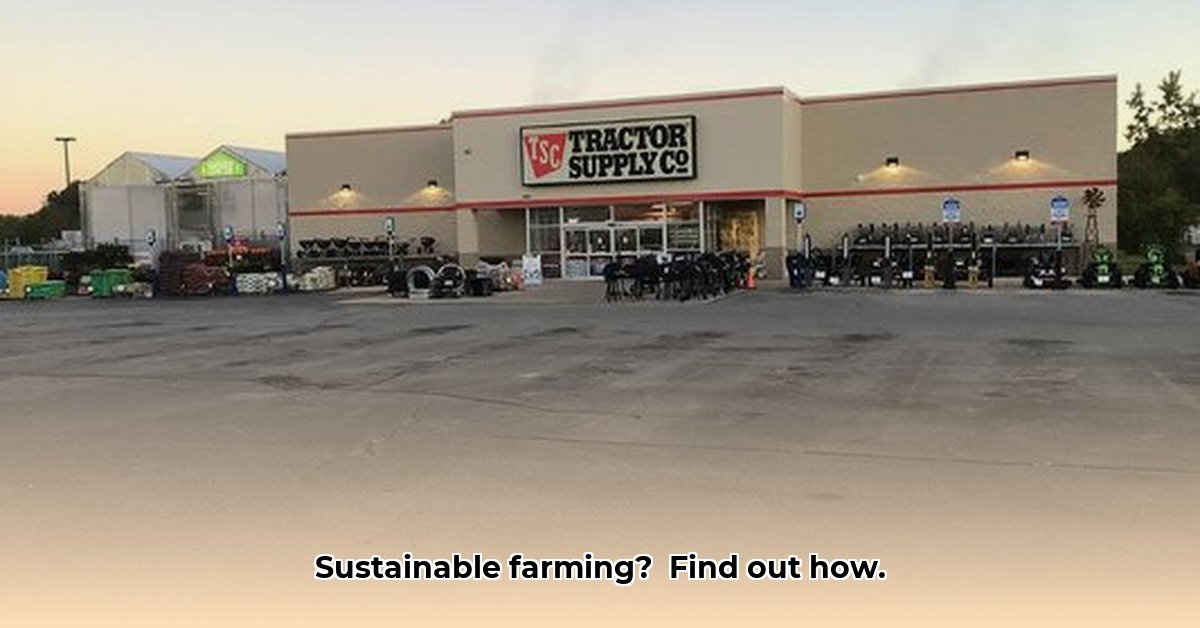
Farmville, Virginia, a community deeply rooted in agriculture, offers a compelling case study to assess Tractor Supply Company's (TSC) contribution to sustainable farming practices. For more information on TSC's fuel and farm tank offerings, see this helpful resource. While TSC boasts ambitious sustainability goals, a comprehensive evaluation requires a localized perspective, examining the tangible impact on Farmville farmers. This analysis reveals both progress and crucial areas for improvement, highlighting opportunities for a greener future.
Understanding Tractor Supply's Role in Farmville's Sustainable Agriculture
Tractor Supply Company's (TSC) Farmville location plays a significant role in the local farming ecosystem, providing essential supplies and services. However, comprehensively evaluating their contribution to sustainable agriculture necessitates a deeper understanding of their practices and their impact on the community. How effectively are they supporting local farmers in adopting environmentally sound methods? This question leads us to explore both evidence of progress and significant gaps in quantifiable data.
TSC's Sustainability Efforts: A Farmville-Specific Analysis
While TSC has publicly committed to ambitious sustainability goals, including achieving net-zero emissions by 2040 1, the extent to which these translate into tangible benefits for Farmville farmers remains unclear. Although TSC reports significant overall carbon emission reductions, exceeding initial targets, the Farmville-specific impact requires further investigation. Are these reductions largely driven by corporate operations, or are they meaningfully influencing farming practices within the Farmville community? We need data to answer this critical question.
Key Areas Requiring Further Investigation
Several crucial data points are currently unavailable, hindering a complete assessment of TSC's impact on sustainable farming in Farmville.
Sales Data Transparency: A detailed breakdown of sales data for organic seeds, eco-friendly pest control, and conventional counterparts would reveal farmer preferences and highlight whether TSC effectively caters to the demand for sustainable products. Are organic options readily available and competitively priced? The absence of this data prevents a precise assessment.
Supply Chain Sustainability: Understanding the entire journey of products from origin to TSC's shelves is vital. This includes examining transportation methods, packaging materials, and manufacturing processes. Are sustainable transportation options utilized, minimizing carbon footprint? Is packaging recyclable or compostable? Lack of transparency in this area limits a thorough evaluation of their environmental responsibility.
Direct Farmer Feedback: Gathering direct feedback from Farmville farmers through surveys and interviews is essential. What are their experiences with TSC's sustainable product offerings? Do they find these options sufficiently accessible and cost-effective? Their perspectives offer invaluable insights that corporate reports alone cannot provide.
Comparative Analysis: Comparing TSC's practices to other farm supply stores in the area would provide valuable context. How does their performance compare in terms of sustainability initiatives and product offerings? Benchmarking against competitors helps to provide a more nuanced evaluation.
Three Pivotal Points for Enhancing Sustainability in Farmville
- Increased Transparency: TSC needs to publicly share comprehensive, Farmville-specific data on their sustainability initiatives. This includes sales data, supply chain information, and environmental impact metrics.
- Direct Farmer Engagement: Regular interaction with Farmville farmers is crucial for understanding their needs and preferences regarding sustainable farming practices. This feedback loop is essential for tailoring offerings and improving services.
- Collaborative Partnerships: Collaborating with local environmental groups and agricultural organizations can foster the exchange of best practices and promote policies that incentivize sustainable farming within the community.
Actionable Steps Towards a Greener Farmville
To enhance TSC's contribution to sustainable agriculture in Farmville, the following steps are crucial:
Conduct a Farmville-Specific Sustainability Audit: TSC should perform a thorough audit of its Farmville store's operations, focusing on environmental impacts and identifying areas for improvement. This audit should include a detailed assessment of the supply chain and a comprehensive review of product offerings. (Target: Completion within 6 months)
Implement Farmer Engagement Programs: Establish regular communication channels with Farmville farmers, conducting surveys, focus groups, and one-on-one interviews to gather feedback and tailor offerings to their specific needs. (Target: 90% farmer participation rate within 1 year)
Promote Sustainable Product Availability: Increase the availability of organic seeds, eco-friendly pest control options and other sustainable agricultural inputs, ensuring competitive pricing to incentivize adoption. (Target: 25% increase in sustainable product sales within 2 years)
Partner with Local Organizations: Collaborate with local environmental groups and agricultural organizations to implement educational programs and promote best practices in sustainable farming. (Target: Partnership agreements with at least 3 organizations within 1 year)
Publicly Share Sustainability Data: TSC should transparently publish Farmville-specific data on its sustainability performance, including key metrics and progress toward goals. (Target: Annual public reporting on Farmville-specific metrics)
By focusing on transparency, collaboration, and farmer engagement, TSC can significantly enhance its contribution to sustainable agriculture in Farmville, creating a more environmentally responsible and economically viable farming community. The journey toward a greener future requires ongoing commitment and proactive measures.